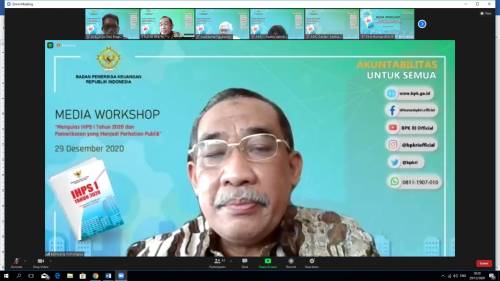In a Media Workshop, BPK Exposes IHPS I 2020 and Audits That are of Public Concern
JAKARTA, BPK Public Relations - In order to provide an understanding on BPK’s audit results, the BPK held an online Media Workshop on Tuesday, reviewing the Summary of Audit Reports of the First Semester of 2020 (IHPS I 2020) and audits that receive public attention.

Attended by 34 participants from print, broadcasting, and online media, the workshop was officially opened by BPK Secretary General Bahtiar Arif. Also present at the workshop were Chairman Agung Firman Sampurna, Vice Chairman Agus Joko Pramono, Board Member III Achsanul Qosasi, and other officials.
The resource persons were Director General of Planning, Evaluation, and Development B. Dwita Pradana, Director General of Audit III Bambang Pamungkas, Director General of Audit VI Dori Santosa, Director General of Investigative Audit Hery Subowo, and Acting Director General of Audit VII Didik Yulianto. The discussion was moderated by the Director of Public Relations and International Cooperation Bureau, Selvia Vivi Devianti.
In his opening remarks, the Secretary General said that the workshop was intended to provide a thorough explanation to the mass media about the results of BPK’s audits carried out in the first semester of 2020, including those that are of public concern. The BPK can later find out the views of the media and obtain inputs from the media regarding the results of BPK's audits.

"Through this workshop, it is expected that it can improve the good relationship between BPK and the media in the future," Secretary General said, adding that "BPK realizes so far that the role of the media in supporting BPK's duties is very important, especially as a channel of information from the BPK to stakeholders, specifically the public, regarding the audit results and other BPK performances." The media is expected to obtain direct information related to BPK’s audit results that they can later convey the right information to the public.
The Director General of Planning, Evaluation, and Development in his presentation explained that the preparation of IHPS I 2020 is a mandate of Article 18 of Law Number 15 Year 2004 concerning the Audit on the State Financial Management and Accountability, stating that the submission of the IHPS to the representative institutions, the president, and Heads of Regional Governments is no later than 3 (three) months after the end of the consecutive semester.

The IHPS I 2020 is basically an overview of the 680 Audit Reports, consisting of 634 Financial Audit Reports, 7 Performance Audit Reports, and 39 Special-Purposed Audit Reports. In addition, the IHPS I 2020 also contains the calculation of the state losses, expert statements, as well as audit results of budget assistance of political parties.
"The IHPS I 2020 is presented based on the grouping of themes and audit focuses in accordance with the 2020-2024 BPK Strategic Plan that also refers to the National Medium Term Development Plan (RPJMN) of 2020-2024. Based on the RPJMN, there are seven national development agendas, four of which have been audited by the BPK, namely the strengthening of the economic resilience for quality growth, there are 39 reports, the improvement of quality and competitive human resources, 1 report, the strengthening of infrastructure to support the economic development and basic services, 3 reports, and the building of the environment, the improvement of disaster resilience and climate change, 2 reports," the Director General said.

He further mentioned that the BPK’s audits during the first semester of 2020 was carried out in midst of the Covid-19 pandemic. As noted in the executive summary of the IHPS, the BPK conducted its audit tasks by applying health protocols and maximizing the use of alternative procedures including the use of information technology. To ensure the quality of the audit results, the BPK has issued several implementation and technical guidelines regarding audits during the Covid-19 pandemic.
"In the first semester of 2020, the BPK has conducted an audit on Covid-19 pandemic response known as a risk-based comprehensive audit. It combines objectives of the three types of audits, so-called as the audit universe, using the big data analytic," he added.
